There's a story they tell here in the rural northeast of Scotland. It's the saga of a man with a famous name and a big bank account, who came from across the ocean promising to turn a stretch of coastal sand dunes into a development that would lure the world's rich and famous, creating jobs and wealth in the process.
The tale, sadly, is a cautionary one. One about believing in promises too big to be true, and of how this man managed to turn the normally laid-back people of Aberdeenshire against one another.
It's a hard-learned lesson that many Scots hope the voters of America will heed before it's too late.
A decade before he began his bid to become president of the United States – vowing to "make America great again!" – Donald Trump landed in Scotland, promising much the same thing. The local oil industry was in decline (the amount of oil recoverable from the bed of the North Sea was already dwindling before the price of crude plunged), and Mr. Trump, suddenly embracing his mother's Scottish heritage, had a vision of how to replace it.
He would build "the world's greatest golf course" along the North Sea coast. There would be 950 new homes, a five-star hotel, 6,000 additional jobs and a whopping £1-billion (about $1.8-billion U.S. at the time) of investment.
Part of the 1,400-acre parcel Mr. Trump had purchased for the project was composed of shifting sand dunes that were protected as a site of "special scientific interest" because of their usefulness to climate-change researchers.
Several families also lived on the land he wanted to develop. But never mind. Those were small details. He was Donald Trump. He was friends with the head of Scotland's government, and he was going to get his way.
And he did get his way. If you drive 30 minutes through barley fields and sheep farms north of the city of Aberdeen, you arrive at a giant clock that marks the entrance to Trump International Golf Links. Next you see Mr. Trump's helicopter pad, where a silver Jaguar convertible has been parked, presumably to prevent other people from landing where he does.
Beside the helipad is a stone mansion, converted into a 16-bedroom hotel that Mr. Trump has renamed MacLeod House after his late mother, Mary MacLeod. At the bar, you can buy Trump wines, Trump beer and even a Trump-brand "Highland Single Malt Scotch Whisky."
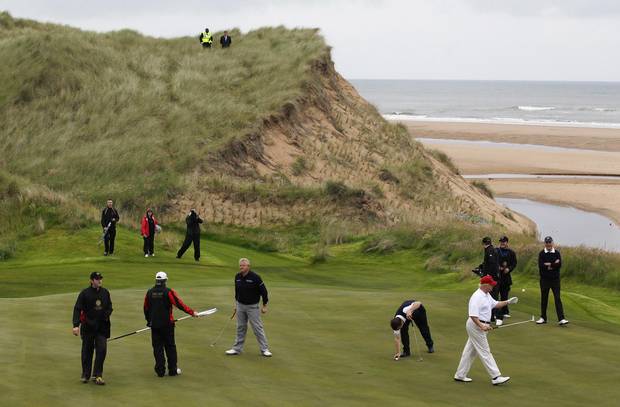
Donald Trump, in white shirt, plays golf during the opening of Trump International Golf Links near Aberdeen in 2012.
DAVID MOIR/REUTERS
The adjacent golf course is striking – in large part because of its setting among the spectacular dunes – but few consider it to be the greatest 18 holes anywhere. Various golf magazines rank the Trump Links, which opened in 2012, somewhere between the 48th and 65th best course in the world. Last fall, golf.com named it the sixth best course in Scotland, the land where the sport was born.
The tourists haven't flocked here yet – even on a sunny Friday early in the golf season, there are fewer than two dozen cars in the parking lot. Neither have the housing units, nor the jobs. Some 150 people are employed by the course, not 6,000. And Mr. Trump's investment to date totals closer to $100-million than the hyped $1.8-billion.
"The reality is he hasn't delivered even 10 per cent of what he promised the people of the northeast of Scotland," says Alex Salmond, the former Scottish first minister who was initially a key backer of Mr. Trump and his project.
What Mr. Trump has delivered to Aberdeenshire in spades is controversy and acrimony. As in the United States, although on a far smaller scale, his actions proved deeply polarizing, widening splits – over what the region is and should be – that the local population had previously stitched over in the name of getting along.
And, as he has done with the Republican Party, this week becoming its presumptive nominee in November, Mr. Trump broke the rules, offended many, and still got his way.
In his victory speech after Tuesday's big win in Indiana prompted Ted Cruz to drop out of the race (followed the next day by John Kasich, his last Republican rival), Mr. Trump referenced his foreign business dealings as a model for how he would reclaim America's supposedly lost place in the world.
"In this building, right upstairs, I have the largest bank in the world, from China," he said, speaking from Trump Tower in New York, which counts the Industrial and Commercial Bank of China among its tenants. "The relationship is fantastic – we have great relations with many foreign companies. But they have to respect us, and they have to understand where we're coming from."
Even now, there are those in Scotland who do respect Mr. Trump, and view him as the saviour he claimed to be.
"People became outraged at Trump and what he was doing, so the views of the people who supported him solidified," explains Andy Wightman, a land-rights expert who has studied the case.
But the outraged are greater in number, and to them, he has always seemed a liar, one with a knack for preying on fears in order to turn people against each other.
Even so, Mr. Trump himself stands proud of his time in Scotland, and says it helped him to prepare for the job he wants next.
"When I first arrived on the scene in Aberdeen, the people of Scotland were testing me to see how serious I was – just like the citizens in the United States have done about my race for the White House," he wrote in a recent column published by The Press and Journal, a pro-business newspaper in Aberdeen.
"Well, Scotland has already been won, and so will the United States."

David Milne says the view from his home has been spoiled by the golf course and a 24-metre-high flag pole. His house was also surrounded by a fence and trees erected by the billionaire.
MARK MACKINNON/The Globe and Mail
AT FIRST, GENTLE ENTREATIES
David Milne's view over the Balmedie sand dunes is spectacular. From the flat rooftop of his two-storey home, they crest and fall to the horizon, presaging the choppy North Sea waves beyond.
The 51-year-old Mr. Milne, a health-and-safety adviser to the oil industry, has a harder time appreciating his view these days, as golfers and their carts crawl over and around the dune like ants in a colony. Most prominent on the horizon now is an oversized Scottish flag installed by Mr. Trump (the pole is 24 metres high) that seems to signal to passing ships that development has come to this previously untouched territory.
Closer in is a ragged line of fence poles the Trump Organization erected around Mr. Milne's property in 2011, surrounded by dozens of trees meant to ensure golfers don't notice there are people living ordinary lives amid the splendour of Trump Links.
To cap it off – years before he would propose building a wall along the U.S. border with Mexico and making Mexico pay for it – the billionaire sent Mr. Milne a bill for about $4,000, or half the cost of the fence.
The home, along with several other privately owned properties within the boundaries of the patch of land he acquired in 2006, was among the details Mr. Trump ignored when unveiling his grandiose plans. The residents came to understand that he expected them to just get out of his way.
At first, the entreaties were gentle. In the summer of 2006, the locals were invited to meet the famous man in a tent pitched at the newly renamed MacLeod House.
"Trump basically introduced himself and said, 'We don't need your homes, we have all the land we need,'" Mr. Milne recalls. What he didn't say – but made very clear later – was that he considered the five homes to be eyesores that would spoil the view of golfers, diners and hotel guests at "the world's greatest golf course."
But the purchase offers, when they came, were surprisingly low. Mr. Milne was offered $315,000 in 2007, which he says was only about 40 per cent of his home's listed value. The second offer, two years later, was for about half the listed value, and featured additional baubles, such as a free membership to the golf course and use of the health club, if and when a proposed larger hotel was built.
Mr. Milne wasn't interested. "Even if we'd wanted to sell, it wasn't financially viable for us to take their offer," he says. Eventually, not selling to Mr. Trump became a matter of principle.
"I already have the best home on the estate, with the best view," Mr. Milne says, waving at the North Sea, where oil tankers and supply ships bob on the water, waiting for their turn to enter the port of Aberdeen. "When Donald Trump stands up there and says he's a truthful man, I'm afraid I stop listening. Because what's coming next is inevitably a lie."
But when he resisted, things got sinister. The fencing, which appeared without consultation, was followed by a succession of water and electricity interruptions that Mr. Trump's builders say were accidental, but which Mr. Milne believes were part of an effort to make it as uncomfortable as possible for him to remain.
Eventually, Mr. Trump tried to legally compel the holdouts to sell. (He denies this, but Mr. Milne says he has seen the court documents trying to force what Scottish law calls a "compulsory purchase," and Mr. Salmond says his friendship with the tycoon ended when he told Mr. Trump that the forced purchase wouldn't succeed.)
"He said, 'Why not?' and I said, 'Have you heard of the Highland Clearances?' And, of course, he hadn't," Mr. Salmond says, referring to the 18th-century actions of large-scale landowners who found it more profitable to give their land over to sheep-grazing than to tenants.
"I don't think our relationship ever recovered from me saying no to him. The problem with Donald is that, if somebody had said no to him – his mom or his dad or someone else – when he was about 5 or 6, his emotional development would have proceeded more normally than it has."
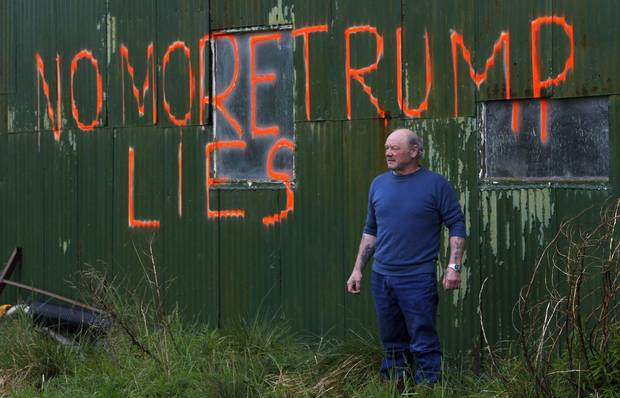
Scottish fisherman Michael Forbes poses for a photograph by the side of a building on his property near Aberdeen in 2010.
DAVID MOIR/REUTERS
Mr. Milne's neighbours have fought similar battles. Michael Forbes, a small-scale salmon fisherman, joined Mr. Milne in refusing to sell, and also had his property fenced in without consultation – blocking his route to the coast where his family has fished for generations. He, too, suffered a prolonged water cut-off in 2010.
Mr. Forbes, who has a collection of rusting farm equipment parked on his property, also suffered the indignity of having a billionaire New Yorker label his home "a disgrace" during a press conference.
A second golf course Mr. Trump is applying to build would be right across the access road that connects Mr. Forbes's property to the main road to Aberdeen. His home would become an island.
That battle, and others, still lie ahead. In the meantime, a clutch of homes where everybody knew each other has become a place where people lock their doors at night. But Mr. Milne and his neighbours are still here.
"They tried to threaten and intimidate us, but it didn't work," he says. "But there's always this little question in the back of your head. You're always wondering what the bugger is up to next."
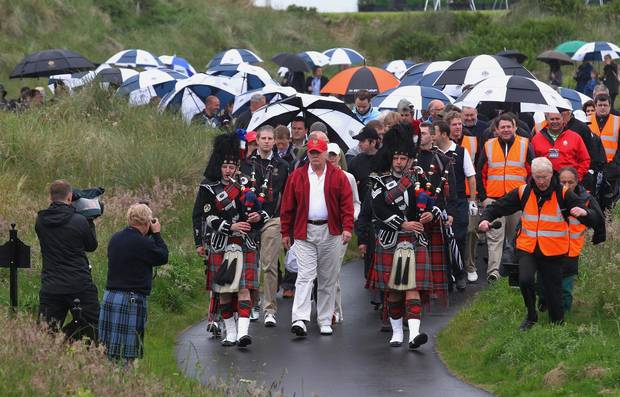
Donald Trump is followed by his guests as he officially opens the Trump International Golf Links golf course near Aberdeen, Scotland, in 2012.
ANDREW MILLIGAN/AP
DIVISIONS, AND PANIC
Martin Ford says that life as a regional councillor for Aberdeenshire used to be a "dull and earnest" existence. The council's 68 members – many of them retired or semi-retired, with long histories of community service – met irregularly to debate such issues as road maintenance, community-centre upkeep, or applications for new taxi licences.
Then along came Donald Trump, and Aberdeenshire Council became a place of what Mr. Ford calls "tribal bullying," where an elected representative could be mocked, harassed, even fired for daring to require that Mr. Trump's golf resort meet the same standards as every other application.
A soft-spoken former scientist who bicycles to work and wears sweaters in the city-council chambers, Mr. Ford is the opposite of the bombastic billionaire in temperament and style. And yet, it was Mr. Ford who found himself chairing the council's Infrastructure Services Committee when it came time to consider Mr. Trump's massive development on the sand dunes of Balmedie.
When the vote was called in late 2007, the 14-member committee – battered by hundreds of letters from the pro-business lobby in support of Mr. Trump's plans, as well as by environmentalists opposing them – was evenly split, seven for and seven against. The fate of Mr. Trump's promises to remake the northeast of Scotland rested solely on the committee's chair.
Mr. Ford voted no. He did so, hoping to force Mr. Trump to come back with a modified proposal, one that avoided building on the scientifically important part of the dunes while also taking into account the concerns of local residents like Mr. Milne and Mr. Forbes.
But Mr. Trump wasn't about to let his plans be altered by a sweater-wearing cyclist. Rather than alter his proposal, or even appeal the decision, he and his allies went on the attack.
Mr. Trump flew that weekend to Belfast and gave Aberdeenshire and Scotland a de facto ultimatum: Approve his plans as they stood, within 30 days, or the golf course, with all its promised jobs and investment, would go to Northern Ireland instead.
Aberdeen's two newspapers, both heavily pro-business, went into a panic. "You traitors," read the front page of the next day's Evening Express, over photos of the seven councillors who had voted no. They were labelled "the seven numpties who cost us £1-billion Trump plan."
Emotions ran so high that Debra Storr, a councillor who had voted no, was confronted and shoved on her doorstep by a Trump supporter, leading to police charges. Looking for a scapegoat, the wider 68-member regional council removed the chair of the infrastructure committee.
"Someone had to be lynched," Mr. Ford says of his dismissal. He says he also received threatening e-mails, as well as racist ones that referred to the fact he is English. "There was a mob mentality. Trump didn't arrange this or control it. But he did fuel it."
Eventually, council chair Anne Robertson found a way to wriggle out of an increasingly difficult position. Legally, the committee's rejection wasn't official until it had been mailed to the applicant. So, even though the decision had been typed up, the council sat on it long enough for the Scottish government to intervene.
The government – then led by Mr. Salmond, also the Scottish National Party (SNP) member of the Scottish parliament for Aberdeenshire East – decided to pull Mr. Trump's application to Edinburgh as an issue of "national interest." It took another year, and a fresh set of hearings, but the plans finally got the go-ahead.
"I think Mr. Trump treated the council the way he treats business rivals in New York," Mr. Ford says now. "We were a bunch of good people trying to do the right thing. We weren't equipped to deal with hard-core U.S. corporate negotiating tactics. We fell apart."

Trump-brand single-malt Scotch whiskey is served at the bar in MacLeod House, a 17th-century mansion Mr. Trump renamed after his mother and converted into a hotel.
MARK MACKINNON/THE GLOBE AND MAIL
'A CHAMPION OF SCOTLAND'
If Donald Trump was born with a silver bugle in his mouth, his mother certainly was not. Mary MacLeod was born in 1912 on the remote Isle of Lewis off Scotland's northwest coast. It was, and remains, a close-knit and predominantly Calvinist community that's now home to fewer than 20,000 people. Her father was a fisherman; her mother worked in the home.
A young Ms. MacLeod took a holiday to New York, where she met Frank Trump, an up-and-coming real-estate developer seven years her senior. The two were married in 1936. Donald, the fourth of their five children, was born 10 years later.
"If Mr. Trump didn't have Scottish roots, I dare say this project wouldn't have happened," says Sarah Malone, executive vice-president of Trump International Golf Links, as she leads The Globe and Mail on a tour of MacLeod House and Trump Links.
The other draw was the Scottish government, which spent years courting Mr. Trump, trying to lure him and his money back to his mother's homeland.
The effort included a "Tartan Day" bash that the government held at the Waldorf Astoria in New York in April, 2005, when Mr. Trump was hailed as a "champion of Scotland," to the bewilderment of those in attendance. A week later, he unveiled his plans for Aberdeenshire.
But Mr. Trump warned early on that his planned investment came with caveats. He would not tolerate any planning hiccups. Nor would he allow a proposed wind farm – 23 turbines off the Aberdeenshire coast that the Scottish government was planning, with financial support from the European Union – to spoil the view.
"Either this will happen very quickly or it won't happen at all," he told The Scotsman newspaper.
After the ultimatum came the sales pitch. "This is a unique opportunity for the Scottish economy. This will be the greatest course in the world."
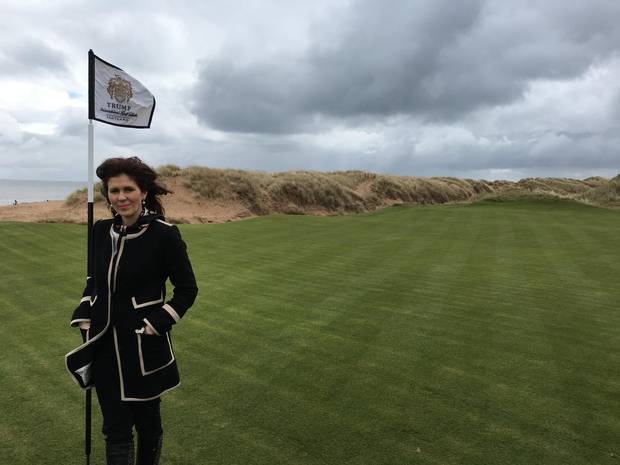
Sarah Malone, the executive vice-president of Trump International Golf Links.
MARK MACKINNON/THE GLOBE AND MAIL
TRIMMED AMBITIONS
Ms. Malone sees all that happened here in the context initially framed by her boss. Were some feathers ruffled? Yes. Did plans and ambitions change along the way? Of course. But is Aberdeenshire better off with Mr. Trump here? Unquestionably.
The regional economy was, indeed, in a downturn before Mr. Trump arrived, she says, a tailspin that has only grown worse as oil prices have declined. The sand dunes that residents fought so hard to protect were "just a windswept piece of land that had been ignored" until Mr. Trump arrived.
And the gap between Mr. Trump's promises, and the delivery to date? The development plan, Ms. Malone says, was never "set in stone," and ambitions have been trimmed because of changes in the global economy. But she says critics are unfair to suggest Mr. Trump somehow misled the government and people of Scotland.
"One hundred million dollars at this stage – and this is not the end – is not to be scoffed at. Who else is spending that kind of money?" she asks. "The reality is, we have a very strong business property here in Aberdeen, and people's lives and jobs depend on it."
Ms. Malone, who was born and raised in Aberdeenshire, directs some of the blame at the neighbours and local councillors who kicked up a fuss – in part because of the outsider's brash style – as well as the media, which she says perceived and propagated a "David and Goliath" narrative in Balmedie.
She also calls the wind farm a "terrible proposal" that Mr. Trump will fight to the end. "We're not in the business of conceding. We're not in the business of giving up," she says, sounding very much like her boss. Mr. Trump, according to Ms. Malone, "feels aggrieved" that the project is going ahead, since he believes Mr. Salmond promised him that the turbines would never be built. (Mr. Salmond says he made no such promise, noting that promoting alternate energy sources has long been a priority of the left-of-centre SNP.)
As for the golf course, Ms. Malone says it's every bit as great as Mr. Trump promised, even if golf magazines don't yet rank it among the world's best. "Words don't do it justice," she says, acknowledging she herself doesn't often play golf.
The only questions Ms. Malone won't answer are those related to Mr. Trump's presidential campaign, which she says hasn't affected business at the course, since it was already so squarely in the public eye.
But she does say that, as a woman who reports directly to him, she doesn't believe Mr. Trump is the misogynist he has been portrayed as since making a series of shocking remarks about women during the campaign. "He's as tough-assed with me as he is with any of the guys," she says.
As we approach the course's astonishing 18th hole – the tee is atop a dune, the fairway down below, challenging golfers to coax their balls to it through the whipping North Sea wind – I ask Ms. Malone whether her sales pitch would be easier if someone like Bill Gates, rather than Donald Trump, employed her to operate a golf course in Aberdeenshire.
She lets slip a quick burst of laughter, then walks back to the car, rattling off more facts about the "sensational" course she runs and the "visionary" she works for.
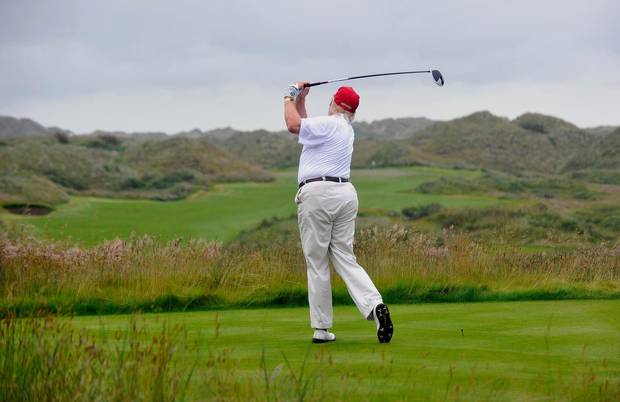
Donald Trump struck the first ball on his new luxury golf course in Scotland in 2012, teeing off in an opening day ceremony alongside Scottish golfing great Colin Montgomerie.
ANDY BUCHANAN/AFP/Getty Images
A SUPPORTER RECONSIDERS
Alex Salmond isn't a man who often admits mistakes. He led the Yes campaign in Scotland's 2014 independence referendum, and prefers to talk today about how close they came, rather than why they lost. Even now, he stands by his claim that the Scottish government did the right thing when it intervened to rescue Mr. Trump's application after the Aberdeenshire committee had rejected it.
But he also admits that he erred in trusting Mr. Trump. And he wants the world to know about it.
"Mr. Trump costs more than he invests," Mr. Salmond says when we meet in the Westminster district of London, where he now sits in the House of Commons as the SNP member for Gordon, a constituency that includes Aberdeenshire. "And that's before the association with totally unacceptable remarks in which he demonized whole religions and whole races," he adds, referring to Mr. Trump's stated desire to ban Muslims from entering the United States and to build a wall along the border with Mexico.
Mr. Salmond says the Donald Trump he met a decade ago was a card-carrying Democrat who donated to Hillary Clinton's election campaigns and opposed the Iraq war. Mr. Salmond liked him – The Scotsman newspaper has wondered at the former first minister's "attraction to men with big wallets and bigger egos" – and fought hard to support the grandiose plan for the district he represented.
If the failure to drive off the neighbours wasn't enough, the two men fell out for good after Mr. Salmond's government indicated that a trimmed-back wind farm – 11 turbines instead of 23, and three kilometres offshore instead of just one – would go ahead.
"With the reckless installation of these monsters, you will single-handedly have done more damage to Scotland than virtually any event in Scottish history," Mr. Trump wrote in a public letter to Mr. Salmond, adding that he planned to spend "a substantial amount of money to launch an international campaign to fight your plan."
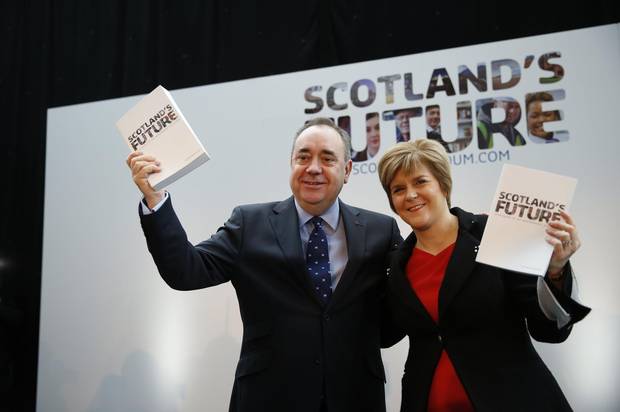
A 2013 photo shows Scotland’s First Minister Alex Salmond and deputy First Minister Nicola Sturgeon holding copies of the referendum white paper on independence during its launch in Glasgow, Scotland.
RUSSELL CHEYNE/REUTERS
In typical Trump style, he added: "Please understand that I am doing this to save Scotland."
While Mr. Trump's legal fight appears doomed – his latest appeal was rejected in December by the Supreme Court of the United Kingdom – the years-long battle has cost the wind project the backing of its main investors.
Mr. Salmond isn't the only prominent Scot who feels burned by the whole experience. In the midst of the furor over the golf course, Aberdeen's Robert Gordon University made Mr. Trump an honorary doctor of business administration "in recognition of his business acumen, entrepreneurial vision and the long-term future his company is planning in the northeast of Scotland," only to have to awkwardly rescind the degree on Dec. 9 after Mr. Trump called for a "total and complete" ban on Muslims entering the U.S.
The same day, the government in Edinburgh – now headed by Mr. Salmond's successor Nicola Sturgeon – ended Mr. Trump's nine-year stint as a global ambassador for Scottish business. Suzanne Kelly, an Aberdeen-based online journalist, launched a petition to ban Mr. Trump from entering the United Kingdom, an effort that quickly gathered hundreds of thousands of signatures, forcing a formal House of Commons debate on the topic.
Mr. Trump, as usual, was unapologetic. "The UK politicians should be thanking me instead of pandering to political correctness," he said the day after the Scottish government and Robert Gordon University ended their association with him. "I have done so much for Scotland."
Such remarks make Mr. Salmond chuckle. "Donald can say hilarious things – for example, how popular he is in Scotland – with no sense of the ridiculous whatsoever. Either he's the greatest deadpan comic of all time, or nobody has told him how unpopular he really is in Scotland."
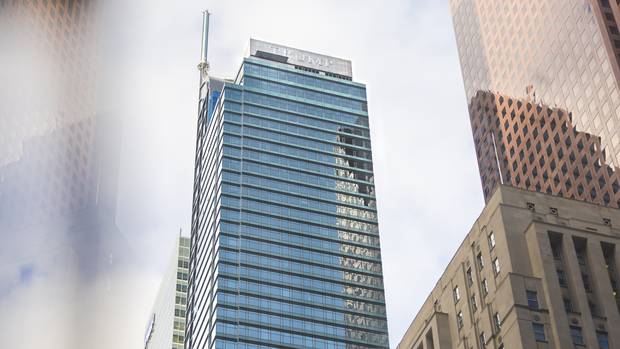
Donald Trump and his troubled Toronto tower: How a partnership came undone
It may not be top-of-mind right now for the would-be President, but things are no longer “great” at the Trump Tower. In fact Donald Trump and his partners are at each other’s throats, writes John Daly
Read the articleA REGRETTABLE WAR
Despite it all, Mr. Trump – or at least his investment – still has some support. James Bream of the Aberdeen and Grampian Chamber of Commerce says jobs have been created in a region where there were none before, and Mr. Trump has brought his "credibility" to Aberdeen's efforts to diversify its economy away from oil and gas.
The city's two main newspapers also remain staunch supporters. Ms. Malone says many others in the region feel the same, even if they're less vocal than the critics.
Martin Ford, the regional councillor who tried to force Mr. Trump to alter his plan, says the culture war that has erupted is especially regrettable, since it could have and should have been avoided. He hopes Scotland's experience will inform the decision U.S. voters make in November.
"What I saw happen here some years ago, sadly, was a man running a publicity campaign in support of a proposal – a proposal made up of ridiculous exaggerations and implausible promises which convinced a significant number of people who should have known better," Mr. Ford says.
"What I'm seeing in the United States is a campaign driven by ridiculous exaggerations and implausible promises, which is again convincing more people than it should. And it is sad to see it happening a second time. Our experience here would suggest: Don't believe him; do not get taken in."
Mr. Ford believes that only now, 10 years later, are the wounds Mr. Trump opened starting to heal. "In a curious kind of way, Mr. Trump's absolutely appalling behaviour has allowed the council to finally agree on something: that he's a horrible man."
Mr. Salmond also feels that Mr. Trump's outrageous remarks on the campaign trail have finally united Scottish opinion about him. "A piece of advice to Donald: Whatever happens [in November], don't ever run for election in Scotland."
Mark MacKinnon is The Globe and Mail's senior international correspondent, based in London.
Follow him on Twitter: @markmackinnon
Editor's note: An earlier version of this article incorrectly said the Highland Clearances referred to the 18-century expulsions of Scot landowners by the English crown. In fact, the clearances were the actions of large-scale landowners who found it more profitable to give their land over to sheep-grazing than to tenants. This version has been corrected.
DONALD TRUMP: MORE FROM THE GLOBE AND MAIL
Trump Jr. responds to Vancouver mayor’s calls to remove ‘Trump’ name from tower
1:19





